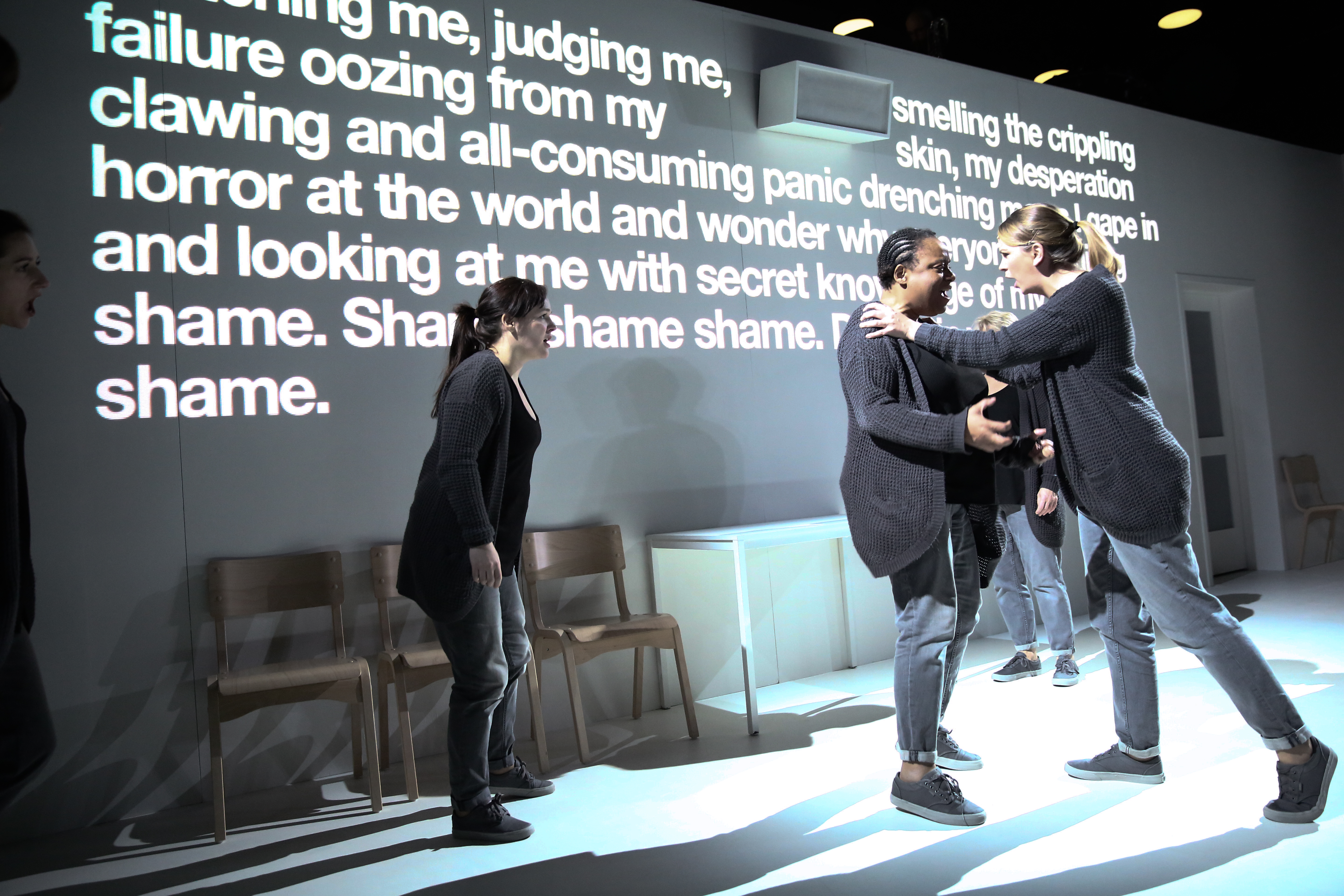VIEWPOINTS – PROTOTPYE 2019 continues to aggressively push the boundaries of opera and music theater
- By drediman
- January 19, 2019
- No Comments

Philip Venables’ operatic adaptation of Sarah Kane’s “4.48 Psychosis” at Baruch Performing Arts Center, an offering at Prototype 2019. Photo by Paula Court.
Musically mining traumatic experiences
At La MaMa Ellen Stewart Theatre
4.48 PSYCHOSIS by Philip Venables
At Baruch Performing Arts Center
THISTREE by Leah Cloff
At HERE Arts Center Mainstage
The 2019 edition of the festival was heavily focused on sonically capturing trauma. There’s definitely precedent – previous Prototype productions like David T. Little’s Dog Days and Missy Mazzoli’s Breaking the Waves jarred and emotionally drained audiences – but Prototype 2019 seemed particularly (and programmatically) eager to disturb and unsettle. Indeed, Ellen Reid’s neo-symbolist opera prism (RECOMMENDED) haunted me at La Mama’s Ellen Stewart Theatre. Ms. Reid’s varied score was one of the strongest of the lot, at ease in a variety of modes, from the opera’s shimmering heights to its gut-punching, visceral musical blows. Of the offerings this year, I was most excited for Philip Venables’ operatic adaptation of late playwright Sarah Kane’s bleakest of bleak 4.48 Psychosis(RECOMMENDED) at the Baruch Performing Arts Center. The operatic version is an appropriately chilly, turbulent piece that still managed to capture the devastating underlying vulnerability of Ms. Kane’s pitch black worldview. Lastly, Leah Coloff ThisTree (RECOMMENDED) at HERE Arts Center’s Mainstage tackled the prospect of living a fundamentally unfulfilled (i.e., childless) life; as with the previous two, Ms. Coloff’s bluesy, dreamlike score uncannily captured the essence of deep-set disappointment and heartache with resignation and, ultimately, grace.
Opera beyond the opera house
TRAIN WITH NO MIDNIGHT by Joseph Keckler
At HERE Dorothy B. Williams Theatre
THE INFINITE HOTEL by Michael Joseph McQuilken
At Irondale
I am pleased to say that Prototype 2019 continued the festival’s trend of pushing the boundaries of what constitutes opera and music theater. Joseph Keckler’s apocalyptic and imagery-heavy Train with No Midnight (HIGHLY RECOMMENDED), which was performed at HERE’s intimate subterranean space, plunged audiences into a pungent, purgatorial cabaret world that totally immersed and mesmerized me. David Lynch would have been proud. Over at Irondale in Brooklyn (an idiosyncratic performance space that’s not utilized nearly as much as it should), I caught Michael Joseph McQuilken’s equally immersive Infinite Hotel (RECOMMENDED), perhaps the most ambitious undertaking of the festival. The production was a beguiling hybrid of theater, immersive performance, cinema, and rock concert. Although not completely successful, it created stimulating layers of overlapping perspectives that I found consistently fascinating.
Focus on the music
OF TIME AND PLACE by Ellen Reid (dreams of a new world) and David T. Little (Am I Born)
At St. Paul’s Chapel
THE LITTLE DEATH: VOL. 1 by Matt Marks
At Roulette
PANCHO VILLA FROM A SAFE DISTANCE by Graham Reynolds
At Bric House
The festival also featured a number of shows that put the focus squarely on the music. For one night only, of time and place (RECOMMENDED) featured two choral works from red hot contemporary opera composers at the acoustically ideal St. Paul’s Chapel – Ellen Reid’s dreams of a new world and David T. Little’s Am I Born. Both were powerful reminders of how music can paint a picture as vividly as any visual art. Also for one night only, I trekked to the Brooklyn venue Roulette to catch the memorial concert performance of the late Matt Mark’s (gone too soon, alas) The Little Death: Vol. 1 (HIGHLY RECOMMENDED), a quirky but completely disarming art music theater piece. Lastly, also in Brooklyn (this time at BRIC House), I saw Graham Reynolds’ rollicking Tex-Mex rock opera Pancho Villa from a Safe Distance (RECOMMENDED), which featured a stripped down staging that nonetheless conveyed time and place evocatively.
A fabulous surprise
MILA, GREAT SORCERER by Andrea Clearfield
At Gerald W. Lynch Theater at John Jay College of Criminal Justice
Of the nine performances I was able to attend, I was perhaps most pleasantly surprised by the premiere production of Andrea Clearfield’s mystical and dramatically compelling two-act opera Mila, Great Sorcerer (HIGHLY RECOMMENDED) at the Gerald W. Lynch Theater at John Jay College of Criminal Justice. Initially, it was indicated that the semi-staged concert, directed by the talented Kevin Newbury (who also beautifully helmed the aforementioned Gregory Spears opera Fellow Travelers), would be closed to critical review. However, it was later deemed accessible to critics when the festival curators realized the staging’s ready-for-primetime production attributes (the singing, orchestral playing, design, and stage direction were all top-notch). Ms. Clearfield’s colorful, expressive score was perhaps the most accomplished and mature of this year’s crop of compositions, which is saying a lot.
2019 PROTOTYPE FESTIVAL
Various venues
Closed

 Copyright © 2025
Copyright © 2025
Leave a Reply